Ode to Psyche1 |
|
O GoddessThe speaker is calling to Psyche.!2 hear these tuneless numbersThe speaker is talking about the verse that follows, i.e. the poem., wrung
By sweet enforcement and remembrance dear,
And pardon that thy secrets should be sung
Even into thine own soft-conched earPsyche's ear looks like a conch shell. One could play a conch seashell as a musical instrument, by blowing through a hole made close to the origin of the spiral.
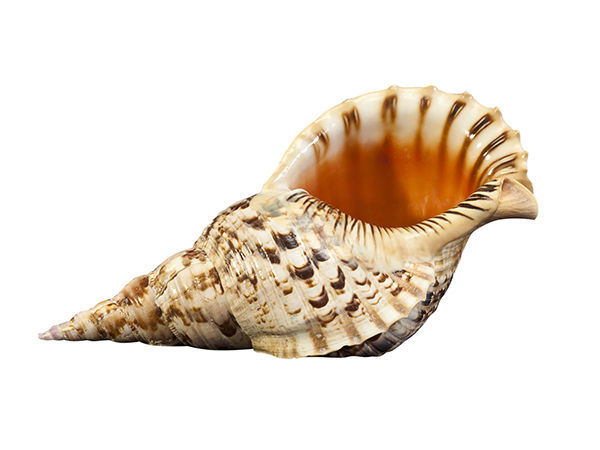 A conch shell.:
A conch shell.:
Surely I dreamt to-day, or did I see
The winged PsycheIn Roman mythology, she is the wife of Cupid. As a gift, Jupiter grants her immortality.
 "Psyche" by Jean-Baptiste Greuze, 1786. with awaken'd eyes?3
"Psyche" by Jean-Baptiste Greuze, 1786. with awaken'd eyes?3
I wander'd in a forest thoughtlesslyWithout thinking about it.,
And, on the sudden, faintingTo grow weak with surprise because of seeing the figures. The speaker is caught off guard by the unexpected sight. with surprise,
Saw two fair creatures, couchedLaid down for rest or sleep. side by side
In deepest grass, beneath the whisp'ring roofA leafy canopy.
 An overhang of leaves that serve as a "roof." 4
An overhang of leaves that serve as a "roof." 4
Of leaves and trembled blossoms, where there ran
A brookletA small brook.
 A secluded brooklet in the woods., scarce espiedScarcely seen.:
A secluded brooklet in the woods., scarce espiedScarcely seen.:
Mid hush'd, cool-rooted flowersFlowers that grow in the shade. These are the blue, silver-white, and Tyrian blossoms.
 A mountain side with blue, white, and purple blooms., fragrant-eyedThe scent of the flower comes from the center of its bloom.,
A mountain side with blue, white, and purple blooms., fragrant-eyedThe scent of the flower comes from the center of its bloom.,
Blue, silver-white, and budded TyrianA rich, purple color. It is named for the royal purple dye produced in Tyre, Lebanon by the Phoenicians.,5
They lay calm-breathing, on the bedded grass;
Their arms embraced, and their pinionsThe outer part or tip of a wing.The pinion is numbered "1" in the photo below.
 The flight feathers of a bird's wing. too;
The flight feathers of a bird's wing. too;
Their lips touch'd notThey were not kissing., but had not bade adieuThey had not said goodbye, or they were still very close together.,
As if disjoinedSeparated. They lie down touching and are only separated by their gentle sleep. Because they are asleep, it is their minds that are separated. by soft-handed slumber,
And ready still past kisses to outnumberOnce awake, they will remain loving and passionate. They will "outnumber" past kisses by kissing even more. Below, Cupid and Psyche are shown as cherubs.
 "The First Kiss" by William-Adolphe Bouguereau, 1873.
"The First Kiss" by William-Adolphe Bouguereau, 1873.
At tender eye-dawn of aurorean loveAurora was the goddess of the dawn, so this is literally the dawn of love. It is a young love or a fresh love.:
The winged boyIf the girl is Psyche, the boy must be Cupid.
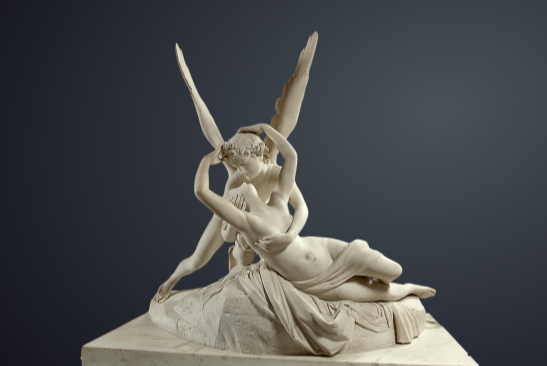 "Psyche Revived by Cupid's Kiss" by Antonio Canova, 1777. I knew;
"Psyche Revived by Cupid's Kiss" by Antonio Canova, 1777. I knew;
But who wast thou, O happy, happy doveCalling Psyche a dove is rare; she is normally shown with butterfly wings, as below. Keats got the inspiration from Mary Tighe's poem "Psyche" (1805), which described the goddess as a "spotless dove."
 "Cupid and Psyche" by Oscar Spalmach, late nineteenth century.?
"Cupid and Psyche" by Oscar Spalmach, late nineteenth century.?
His Psyche true!
O latest bornPsyche is the newest member of the Greek pantheon. and loveliest vision far
Of all Olympus' faded hierarchyBelief in the Greek pantheon has obviously waned through the centuries. Since it is belief that keeps these gods alive, they are fading from existence.!
Fairer than Phoebe's sapphire-region'd starMost critics agree that this is the mooon. In Greek mythology, Phoebe was one of the original Titans, traditionally associated with the moon. Sapphire is a saturated shade of blue, referring to the gem of the same name. So, instead of appearing against the black background of the night sky, this moon appears against a blue background. So Keats here presents the beauty of the moon seen in daylight.,
Or VesperThe planet Venus, also called "the evening star.", amorous glow-worm of the sky;
Fairer than these, though templeWhile many gods and goddesses are worshipped in temples, given flowers, and sung to, Psyche has none of these.
 Temple of Hephaestus, the god of metal-working. thou hast none,6
Temple of Hephaestus, the god of metal-working. thou hast none,6
Nor altar heap'd with flowersTo show appreciation to the gods, many temple visitors left offerings such as flowers. Because Psyche had no temple, no one left her flowers.
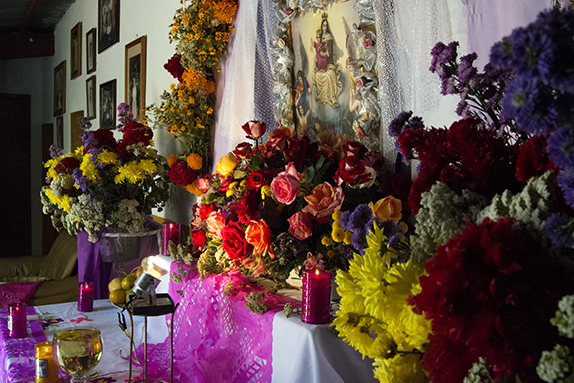 Flowers left around an altar.;7
Flowers left around an altar.;7
Nor virgin-choirNo one sings praises to Psyche. Keats is pulling together several meanings here. He is referring to the Vestal Virgins, priestesses of Vesta, the goddess of the hearth in ancient Rome. They were not obligated to marry and bear children, and took a vow of chastity in order to maintain a sacred fire that was not allowed to go out, and study and correctly perform rituals that were not the province of male priests. As above, faith in this pantheon has faded.
He's also alluding to Horace's Ode XXI, which is an exhortation to young men and virgins to sing the praises of Diana and Apollo. Diana was the virgin goddess of childbirth and women. She was one of the three maiden goddesses—along with Minerva and Vesta—who swore never to marry.
Finally, Keats refers to the virgin choirs in Christianity, both those who are alive, who live in community in convents and who have taken vows of chastity, and those who have died, and are grouped togehter in heaven to sing the praises ofthe Divine (as with the "choirs of angels").
 "The Choir of Virgins" from the 10th-century Benedictional of St. Aethelwold. to make delicious moan
"The Choir of Virgins" from the 10th-century Benedictional of St. Aethelwold. to make delicious moan
Upon the midnight hours;
No voice, no lute, no pipe, no incense sweet
From chain-swung censerA censer holds charcoal used to burn incense used for religious rituals. The censer itself swings from a chain.
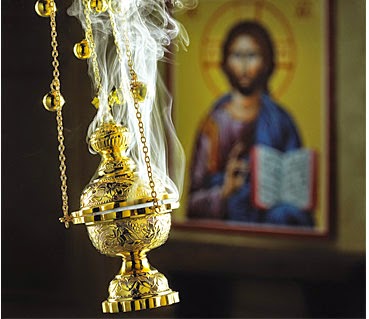 A smoking censer. teeming;
A smoking censer. teeming;
No shrine, no grove, no oracle, no heat
Of pale-mouth'd prophet dreamingA. Hamilton Thompson offers that "pale-mouthed" refers to the Oracle (Pythoness) at Delphi, whose prophetic ecstasy "was accompanied by foaming at the mouth" (151).
But since heat is involved, Keats could also be referring to the cleansing and call of the Old Testament prophet Isaiah, in Isaiah 6:5-8:
(5) Then said I, Woe is me! for I am undone; because I am a man of unclean lips, and I dwell in the midst of a people of unclean lips: for mine eyes have seen the King, the LORD of hosts. (6) Then flew one of the seraphims unto me, having a live coal in his hand, which he had taken with the tongs from off the altar: (7) And he laid it upon my mouth, and said, Lo, this hath touched thy lips; and thine iniquity is taken away, and thy sin purged. (8) Also I heard the voice of the Lord, saying, Whom shall I send, and who will go for us? Then said I, Here am I; send me. (KJV)
This second image would acount for the heat comng from the prophet's mouth and the paleness or brightness of the mouth, both caused by the purifying coal..8
O brightest! though too late for antique vows,9
Too, too late for the fond believing lyre,A stringed instrument played for the gods.
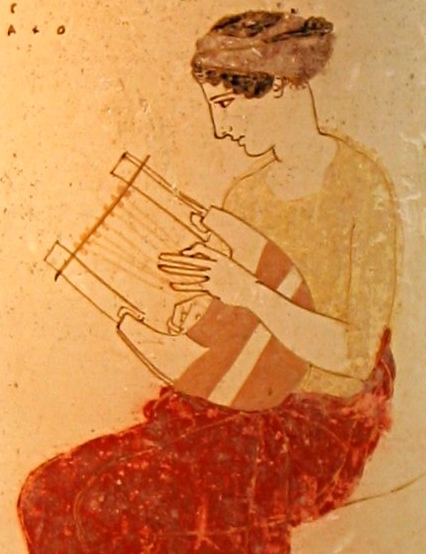 One of the nine muses playing a lyre.
One of the nine muses playing a lyre.
When holy wereThe speaker is relfecting back to when humans considered many things and places sacred because the gods had great interactions with humans, and either inhabited certain places or held those places dear to themselves. the haunted forest boughs,
Holy the air, the water, and the fire;
Yet even in these days so far retir'd
From happy pietiesConventional beliefs or standards, here those that honored Psyche., thy lucent fansPsyche's wings, often shown as butterfly wings. They are described in both senses of the word "lucent": full of light and translucent or clear.
 "Psyche" by John Reinhard Weguelin, 1890.,
"Psyche" by John Reinhard Weguelin, 1890.,
Fluttering among the faint OlympiansKeats maintains the series of images that refer to the loss of faith in ancient religions, and thus the fading of their gods.,
I see, and sing, by my own eyes inspir'd.
So let me be thy choirKeats begins to countermand the series of images from the previous stanza. He himself will fill in for all that Psyche does not have., and make a moan
Upon the midnight hours;
Thy voice, thy lute, thy pipe, thy incense sweet
From swinged censer teeming;
Thy shrine, thy grove, thy oracle, thy heat
Of pale-mouth'd prophet dreamingThe speaker stands in awe of Psyche, mouth open, and offering to be everything: her music, temple, incense, and light..
Yes, I will be thy priest, and build a faneA temple. In the next line, Keats proposes to create this space for worship, not in the natural world, but within his mind.
 "Psyche in the Temple of Love" by Edward John Poynter, 1882.
"Psyche in the Temple of Love" by Edward John Poynter, 1882.
In some untrodden region of my mind,
Where branched thoughts, new grown with pleasant pain,
Instead of pinesThe "branched thoughts" are the trees surrounding Psyche's temple in the speaker's mind, like actual trees would around a real temple. They take the place of the "haunted forest boughs" of line 38. shall murmur in the wind:
Far, far around shall those dark-cluster'd trees
FledgeTo form a feather-like covering. the wild-ridged mountains steep by steep;
And there by zephyrsWinds., streams, and birds, and bees,
The moss-lain DryadsA wood nymph or nymph of the trees. Dryads or nymphs were female personifications of natural features, like mountains and rivers; they were young, beautiful, long-lived, and liked music and dance. A Dryad was connected to a specific tree and died when the tree died.
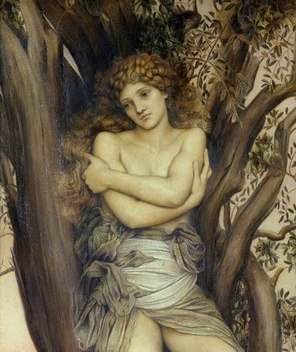 "The Dryad" by Evelyn De Morgan, 1885. shall be lull'd to sleep;
"The Dryad" by Evelyn De Morgan, 1885. shall be lull'd to sleep;
And in the midst of this wide quietness
A rosy sanctuary will I dress
With the wreath'd trellisA structure that uses lattice work to support the growth of plants and vines. This "trellis of a working brain" helps the "branched thoughts" that make up Psyche's temple grow.
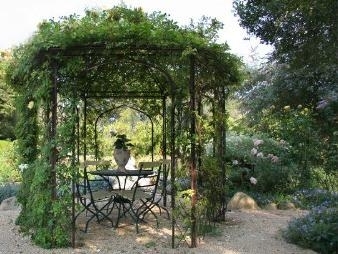 A trellis in a victorian garden. of a working brain,
A trellis in a victorian garden. of a working brain,
With buds, and bells, and stars without a name,
With all the gardener FancyThe speaker's imagination. e'er could feign,
Who breeding flowers, will never breed the sameThese flowers are the speaker's thoughts and each one is unique. By keeping Psyche's temple in his imagination, the speaker is ensuring perfection and originality.:
And there shall be for thee all soft delight
That shadowy thought can win,
A bright torch, and a casement ope at nightA casement is a window that opens with hinges. The speaker promises to make sure one is left open each night so Cupid can visit her.
 An open window.,
An open window.,
To let the warm Love inThe window is open so Cupid can come to her. This is how Cupid came to see Psyche in their myth.
 "Cupid and Psyche" by John Roddam Spencer Stanhope, 1880.!10
"Cupid and Psyche" by John Roddam Spencer Stanhope, 1880.!10
Notes
1. While there is no concrete date, "Ode to Psyche" was likely the first of the "Great Odes." It was written late spring in 1819.
The original version of the ode is found in a letter from Keats to his brother George. Keats often wrote whole weeks worth of accounts and then mailed them as a large groupto George and his wife Georgiana in America. The spring 1819 letter ends with: "The following Poem– the last I have written is the first and the only one with which I have taken even moderate pains– I have for the most part dash'd of[f] my lines in a hurry– This I have done leisurely– I think it reads the more richly for it and will I hope encourage me to write other thing[s] in even a more peaceable and healthy spirit."
"Ode to Psyche" is a very literary poem with influences from Shakespeare, Milton, Coleridge, William Adlington, Spenser, and Erasmus Darwin (Roe 319).
2. To fully appreciate "Ode to Psyche," it is important to know the myth behind her. From Metamorphoses by the 2nd century AD novelist and rhetorician, Apuleius:
Once in an unnamed kindom, the gking had three beautiful daughters; the loveliest daughter was Psyche. When people gave her more attention than Venus, the goddess grew jealous, and told her son Cupid to make Psyche fall in love with a monster. But when Cupid finally saw Psyche, he dropped the arrow meant for her, pricked himself, and fell in love with her.
Even though she was beautiful, no one asked for Psyche's hand. An oracle foretold that she was destined to marry a monster, and they must desert her at the top of a mountain. Once there, the west wind took her to a palace. When night came, her new husband visited her, and told her that he would only see her at night and she cannot ever see his face.
When Psyche became homesick, she asked that her sisters be allowed to visit. When they saw her new life, the sisters became jealous and convinced Psyche to peek at her husband to see if he was a horrible monster.
The next night Psyche lit a lamp to finally see her husband's face. When she saw handsome Cupid, she was so shocked that didn't notice hot wax fall onto his shoulder, waking him. Angry, he quickly vanished.
Psyche began searching for Cupid, but to no avail. Desperate, she asked his mother, Venus, for help. Still jealous, Venus gave Psyche grueling tasks to complete first. With the help of creatures and other gods, Psyche finished them all. When Cupid heard of Psyche's journey to find him, he returned to her side. They were married and Jove gave Psyche immortality so she and Cupid could be together always.
3. This question is similar to the closing lines of "Ode to a Nightingale": "Was it a vision, or a waking dream? / Fled is that music:—Do I wake or sleep?"
4. Originally, Keats wrote this line as "whispering fan," but his publishers changed it to "whisp'ring roof," which ruins the rhyme-scheme.
5. Keats originally used "syrian" but the publishers used "Tyrian" instead. Even in Keats' time, "syrian" meant "from Syria," so his true intent is unclear.
6. In the same packet of letters to his brother, Keats wrote about Psyche having no temple:
You must recollect that Psyche was not embodied as a goddess before the time of Apuleius the Platonist who lived after their A[u]gustan age, and consequently the Goddess was never worshipped or sacrificed to with any of the ancient fervour—and perhaps never thought of in the old religion—I am more orthodox tha[n] to let a he[a]then Goddess be so neglected.
7. In describing these rituals for worship, Keats engages almost every sense. The eye sees the beauty of the decorated temple; the ear hears the airy voices of the choir; the nose smells the perfumed incense.
8. Keats concludes here a litany of lost rituals of worship. Psyche has no temple dedicated to her, no altar upon which humans might make sacrifice to her, no choir to sing her praises, not even a single voice to sing about her. She has no stringed instrument or wind instrument or incense used in rituals dedicated to her. Finally, she has no space dedicated to her, no sacred shrine, no sacred grove of trees (as was common in both Greek and Roman worship of the gods), and no prophet or person to offer wise counsel or predictions of the future in her name.
9. Psyche has become recognized after the glorious days of gods and goddesses. Everything used to be sacred because it was a gift from the gods. Deities could be found in forests, rivers, and the air. In the opening stanza, the speaker is surprised to see deities in the woods; had it been the time of Olympus, he would not have been so surprised. Psyche is too late; the old ways of worship, along with the deities thus worshipped, no longer hold sway.
10. During editing, Keats changed the last line from "To let warm Love glide in" to "To let the warm Love in." An easy connection to make is that it references Pysche's myth. In the castle, Cupid would only come see her at night. When he catches her looking at him, he vanishes out the window.
The other connection is between Keats and Fanny Brawne. She lived next door to the poet and they shared a common garden; their windows could open up to one another. The language in "Ode to Psyche" has similarities to some of Keats' love letters to Fanny Brawne. He wrote of building an altar to her in celebration. He also declared love to be his religion and Fanny "its only tenet."